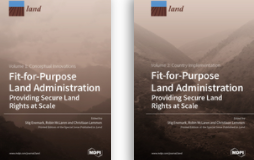New Publication on Fit-For-Purpose Land Administration
The Fit-For-Purpose Land Administration (FFPLA) approach is gaining momentum and acceptance within the land professional community. It’s a game changer in achieving key aspects of the global agenda (the SDGs) towards greater social equity, leaving no one behind.
Conceptual innovations of FFPLA
26 open access articles on FFPLA have been published in a Special Issue of the scientific journal ‘Land’. The articles present a range of conceptual innovations of FFPLA and a number of good practice examples of implementation in countries such as Brazil, Colombia, the Caribbean, India, Nepal, Mozambique, Uganda, South Africa and Benin.
FFPLA approach works
These examples showcase new solutions to the building of affordable, pro-poor, scalable, and sustainable systems. They demonstrate how to identify and document the way all land is occupied and used. The Special Issue provides evidence that the FFPLA approach works.

Target Group
The books provide some very encouraging lessons learned, as well as exciting, innovative technologies to inspire land professionals to achieve the challenging objectives of the SDGs. Land professionals are decision makers in cadastral and land registration organisations, project leaders in initial data collection projects, surveyors, lawyers, conveyors, land information system designers – et cetera.
Download the free digital version
The articles have also been compiled into a two-volume book. Volume One deals with conceptual innovations while Volume Two is focused on country implementations. The digital versions of the articles and the books are freely accessible to everyone:
Picture 1. The covers of both books

Funding and publication
The funding of the publication costs for the articles included in this Special Issue, has kindly been provided by the School of Land Administration Studies, Faculty of ITC from the University of Twente, in combination with Kadaster International. Editors are the developers of the FFPLA methodology: Stig Enemark, Robin McLaren and Chrit Lemmen.